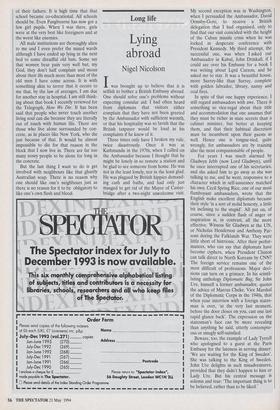Long life
Lying abroad
Nigel Nicolson
Iwas brought up to believe that it is selfish to bother a British Embassy abroad. One should solve one's problems without expecting consular aid. I had often heard from diplomats that visitors either complain that they have not been greeted by the Ambassador with sufficient warmth, or that his hospitality was so lavish that the British taxpayer would be loud in his complaints if he knew of it.
Three times only have I broken my rule, twice disastrously. Once it was at Kathmandu in the 1970s, when I called on the Ambassador because I thought that he might be lonely in so remote a station and be glad to see someone from home. He was not in the least lonely, nor in the least glad. He was plagued by British hippies demand- ing cash and baths, and had only just maaged to get rid of the Mayor of Caster- bridge after a two-night unwelcome visit. My second exception was in Washington, when I persuaded the Ambassador, David Ormsby-Gore, to receive a British delegation that I had organised, only to find that our visit coincided with the height of the Cuban missile crisis when he was locked in desperate conference with President Kennedy. My third attempt, the successful one, was when I asked our Ambassador in Kabul, John Drinkall, if I could see over his Embassy for a book I was writing about Lord Curzon, and he asked me to stay. It was a beautiful house, more Surrey-like than Surrey, complete with golden labrador, library, nanny and coal fires.
In spite of that one happy experience, I still regard ambassadors with awe. There is something so vice-regal about their title and accommodation that one assumes that they must be richer in state secrets than a cabinet minister, but better at keeping them, and that their habitual discretion must be incumbent upon their guests as well. Hence one is tongue-tied, quite wrongly, for ambassadors are by training also the most companionable of people.
For years I was much alarmed by Gladwyn Jebb (now Lord Gladwyn), until he once interrupted one of his secretaries, and she asked him to go away as she was talking to me, and he went, responsive to a character which in self-assurance matched his own. Cecil Spring Rice, one of our most flamboyant ambassadors, wrote that the English make excellent diplomats because their style 'is a sort of stolid honesty, a little bit inclining to the stupid'. All put on, of course, since a sudden flash of anger or inspiration is, in contrast, all the more effective. Witness Sir Gladwyn at the UN, or Nicholas Henderson and Anthony Par- sons during the Falklands War. They were little short of histrionic. After their perfor- mances, who can say that diplomats have become cyphers, when President Clinton can talk direct to North Koreans by CNN? The foreign service remains one of the most difficult of professions. Major deci- sions can turn on a grimace. In his scintil- lating anthology Diplomatic Bag, Sir John Ure, himself a former ambassador, quotes the advice of Marcus Cheke, Vice Marshal of the Diplomatic Corps in the 1940s, that when your interview with a foreign states- man is over, 'at the very last moment, before the door closes on you, cast one last rapid glance back'. The expression on the statesman's face can be more revealing than anything he said, utterly contemptu- ous or smugly self-satisfied.
Beware, too, the example of Lady Tyrrell who apologised to a guest at the Paris Embassy for the lateness in serving dinner: 'We are waiting for the King of Sweden'. She was talking to the King of Sweden. John Ure delights in such misadventures, provided that they didn't happen to him or Lady Ure. But his central message is solemn and true: 'The important thing is to be believed, rather than to be liked.'




































































 Previous page
Previous page